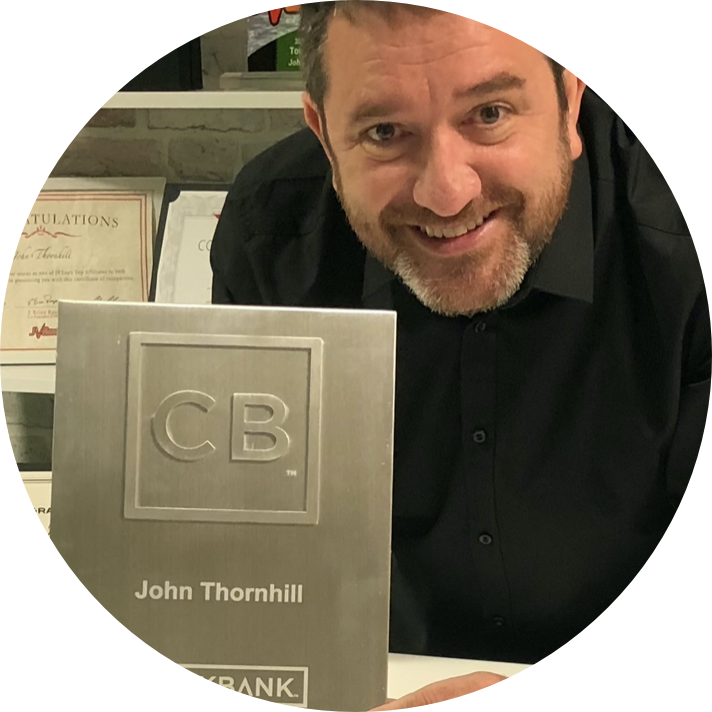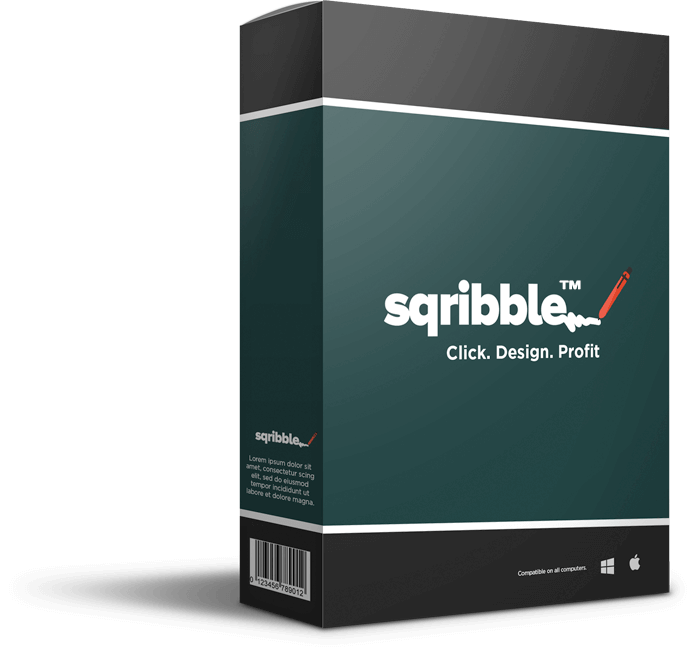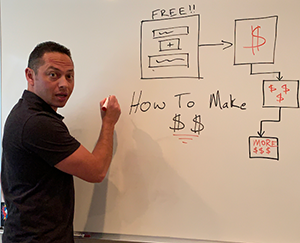Why Leadership Requires a Conscience: The Shift CEOs Can’t Ignore written by John Jantsch read more at Duct Tape Marketing
The Duct Tape Marketing Podcast with Andrew C.M. Cooper In this episode of the Duct Tape Marketing Podcast, I interviewed Andrew C. M. Cooper, author of ‘The Ethical Imperative: Leading with Consciousness to Shape the Future of Business. We discuss the importance of ethical leadership and the impact of the pandemic on business practices. […]
Why Leadership Requires a Conscience: The Shift CEOs Can’t Ignore written by John Jantsch read more at Duct Tape Marketing
The Duct Tape Marketing Podcast with Andrew C.M. Cooper
In this episode of the Duct Tape Marketing Podcast, I interviewed Andrew C. M. Cooper, author of ‘The Ethical Imperative: Leading with Consciousness to Shape the Future of Business.
We discuss the importance of ethical leadership and the impact of the pandemic on business practices. He emphasizes the need for companies to care about their employees and the issues that their employees care about. Andrew Cooper also explores turning in business and the cyclical nature of societal challenges. He suggests that companies should authentically align their actions with their values and navigate the balance between doing the right thing and the potential cost. Cooper also discusses the educational potential of virtual and mixed reality in understanding complex societal issues.
Key Takeaways
Chapters
- [00:00] Introduction: Andrew C. M. Cooper and ‘The Ethical Imperative’
- [02:32] Leading with Consciousness: The Ethical Imperative
- [05:17] The Impact of the Pandemic on Business Practices
- [10:12] Navigating the Balance: Doing the Right Thing vs. Cost
- [17:27] Exploring Complex Societal Issues through Virtual Reality
- [20:36] Conclusion: Connect with Andrew C. M. Cooper
More About Andrew C.M. Cooper:
- Add Andrew Cooper on LinkedIn
- Check out his Website
- Grab a copy of The Ethical Imperative: Leading with Conscience to Shape the Future of Business
Like this show? Click on over and give us a review on iTunes, please!
Connect with John Jantsch on LinkedIn
This episode of The Duct Tape Marketing Podcast is brought to you by:
Oracle
Nobody does data better than Oracle. Train your AI models at twice the speed and less than half of the cost of other clouds. If you want to do more and spend less, take a free test drive at oracle.com/ducttape
Wix
work in sync with your team all on one canvas, reuse templates, widgets and sections across sites. Create a client kit for seamless handovers and leverage best in class SEO defaults across all your Wix sites.
Andrew Cooper & John Jantsch (00:00): Herbert Dow over Dow Chemical. He said the most effective way of working is to care for our employees and to see that they are happy and contented. That is a very different than if you fast forward post 1970 and you look at a CEO like Albert Dunlap. At Sunbeam, Albert said, employees don’t matter. The only thing that matters is shareholder value, which I think more often reflects a modern kind of pre 20th century view than what I previously described.
(00:32): Hello and welcome to another episode of the Duct Tape Marketing Podcast. This is John Jantsch. My guest today is Andrew CM Cooper. He’s a Fortune 500 executive attorney, inventor, lecturer, writer, and board director. Couldn’t decide on what clear he wanted, I guess. He’s currently the Associate General Counsel for Strategic Transactions and Mergers and Acquisitions at Meta Platforms Inc. He’s also the author of a book we’re going to talk about today, the Ethical Imperative, leading With Conscious to Shape the Future of Business.
(01:04): So Andrew, welcome to the show. Hey, John, thanks for having me. So I don’t want to get too sidetracked here, but I can’t help notice the saxophone in the background and the word inventor in your bio. So can you share what inventor, how that label got applied? Sure. Yeah. Like he said, sometimes I don’t think I can decide on a specific career path, so I try to embrace ’em all right. Actually, I helped to invent a method for landing unmanned aerial systems. So UAVs on top of UPS package cars, which matured into a US patent along with two other inventors. My primary vocation is a patent lawyer, so that’s kind of where the inventor came in. And then the saxophone, that thing is collecting dust over there in the corner is, I haven’t picked it up since maybe a few years now, but I played alto saxophone and band in school and just kept it around.
(02:00): I grew up in Kansas City, Missouri, and we liked to play Charlie Parker as our favorite son, but I think he used to play there a lot. I don’t know, did you see in my bio that I used to work out in Kansas City? No, I didn’t. You’re right. My very first law firm was ARDI and Bacon. Oh, sure. Of course. Out in Kansas City, Missouri. And my wife and I, we lived in Raytown. You probably know Raytown not far from there. Course, of course. Yeah. That’s great. Well, I’ve just completely upended up the topic for the show here. We better get into your book. So the title, ethical Impairment with Consciousness to Shape the Future of Business certainly is a topic that is, I would say has evolved, feels like there’s a whole lot more intentional information about this concept. Would you say that there is a generational aspect that is kind of driving that evolution?
(02:48): Without a doubt. I think the number of executives come from the old school School of thought. We have Milton Friedman approach to business. The only thing that matters is making profit, and that just doesn’t resonate these days with younger executives. And honestly, that is the reason I’ve wrote this book about every other show I do. I blame something else on the pandemic. Would you say that you actually refer to it as a pivotal event in kind of bringing this consciousness to the forefront, would you say Maybe it was happening, but that certainly accelerated it my entire career avoiding weighty issues like death, but the Pandemic brought it right to my doorstep. I was sitting in my office one day and I get a phone call and I pick it up and someone says, Hey, we’d like to get some services from you guys. I’m like, okay, this is a totally normal call, but why are you calling the legal department?
(03:39): I shouldn’t be talking to our marketing and sales guys. They’re like, yeah, no, you don’t understand what we need are refrigerated containers to hold dead bodies because our morgues are overflowing. And in an instant, my world was turned upside down to really start thinking about things like death. I had members on my team that suffered multiple deaths, one after the other, taking care of human beings became the primary concern during the, I think most executives will know during that period of time. And the truth is, I began journaling about what my team was going through, and that kind of matured into for earliest parts of the book. But the truth is the pandemic though it was a pivotal event, it didn’t change the way business was being done, that what really changed is who we were as people, what we cared about. There was one question that I think came to the top of everyone’s mind during the pandemic and is it’s, do you care about me?
(04:39): And that really put work in perspective for a lot of people. The relationship between work and worker changed, and because of that, our considerations as leaders to regain performance has to change as well. So you mentioned care about me, but is there also an aspect of do you also care about the things I care about, right, the dream, the planet, not like it’s disposable. I mean, would you say that, so I can have all the nice fess the show you care about me, but I also care about a lot of things out there. I mean, what element does that role in? It’s an enormous element. So I grew up in a small rural town in South Carolina called Walterboro, South Carolina on the wrong side of the train tracks. And my neighborhood was literally dirt easements. There were no paved roads. And I grew up in a single wide trailer, and I talk about the death of the Walterboro economy in my book.
(05:35): That was a result of the loss of industry. It was a real economic catastrophe, similar but not as deadly as the death of East Palestine, the railroad industry in East Palestine, Ohio, which recently had a catastrophic event. But what ends up happening when you grow up on the wrong side of the train tracks is that you realize that there are people over there that need help. And the first chapter of my book, it’s about forgotten towns. The second chapter is about forgotten people. And these are two groups, two things that organizations and leaders need to really focus on if they are to survive that tomorrow’s economy. I read recently some statistics that 84% of millennials give to charity, and that has only been going up by generation. Gen Z is right behind them on that. And in addition to giving, they want know, they want to work for organizations that they know care about, those issues that they care about.
(06:40): So it’s two things that, hey, where are the resources going? Where’s my money going? And then where is my time going? And I want to align my future with those two things because that’s where I see real value. That’s where I see care and concern. I wonder if you could unpack a concept because you talk about it as you have actually called it an existential challenge, the idea or the concept of turning in business. Yeah. So we are adding a generational junction. I really enjoy the book by Neil Howe, the For Turning, and I highly recommend it to the listeners. But the idea is that we are, there are some things that happen over and over again, their cyclical and a lot of ways. In a lot of ways we can look at the period that we’re in as businesses and as an economy similar to those who were to businesses pre 1970.
(07:38): So if you go back between 1920 and 1970, what you find are a generation of people. So you’ve got the silent and you’ve got the greatest generation working in businesses and organization, and they are navigating through what was a generation defining event. So you had the World War Wars, world War ii, and then just before 19 20, 19, 17 time period, you had a similar pandemic like event. And when you look at what CEOs cared about, you look at guys for example, like Thomas Watson at IBM or David Packard at hp. They were on record saying things like, to build a business that lasts, we must treat employees with the same care, respect and consideration that we give our best customers. That came from Thomas Watson, Herbert Dow over at Dow Chemical. He said The most effective way of working is to care for our employees and to see that they are happy and contented.
(08:37): That is a very different than if you fast forward post 1970 and you look at a CEO like Albert Dunlap at Sunbeam, he was famous for tearing companies apart. And Albert said, employees don’t matter. The only thing that matters is shareholder value, which I think more often reflects a modern kind of pre 20th century view than what I previously described. But the experiences that we’re having now in 2020, and for the next 50 years between 2020 and 2070 ish, we’re going to be experiencing a generation of people that are looking to reinvest in humans. Despite all the things you see on news about AI and technology taking over, there is going to be a re-engagement with humanity and the human condition to address the issues that were at the forefront back in the 1920s, in the 1930s and the 1940s, there is a new crusaded business, and my hope is that with this turning, executives will lean into conscientious behavior and conduct.
(09:49): Hey, digital marketers, this one’s for you. I’ve got 30 seconds to tell you about Wix Studio, the web platform for agencies and enterprises. So here are a few things that you can do in 30 seconds or less when you manage projects on Wix Studio. Work in sync with your team all on one canvas, reuse templates, widgets and sections across sites. Create a client kit for seamless handovers and leverage best in class SEO defaults across all your Wix sites. Alright, time’s up, but the list keeps going. Why don’t you step into Wix studio to see more AI might be the most important new computer technology ever. It’s storming every industry and literally billions of dollars are being invested. So buckle up. The problem is that AI needs a lot of speed and processing power. So how do you compete without cost spiraling out of control? It’s time to upgrade to the next generation of the cloud.
(10:48): Oracle Cloud infrastructure or O-C-I-O-C-I is a single platform for your infrastructure, database, application development, and AI needs. OCI has four to eight times the bandwidth of other clouds offers one consistent price instead of a variable regional pricing. And of course, nobody does data better than Oracle. So now you can train your AI models at twice the speed and less than half of the cost of other clouds. If you want to do more and spend less like Uber eight by eight and Databricks Mosaic, take a free test drive@ociatoracle.com slash duct tape. That’s oracle.com/duct tape oracle.com/duct tape. So one of the concepts of that book, I also read that a few years ago was this idea of cycles. Of course it’s turning and that there was a bottoming out that had to happen. Have we had fun? Have we bottomed down? I hope so. I hope so.
(11:49): We have seen, and I talk about this in the book, we’ve seen enormous challenges in the economy. If you just look at the banking sector, for example, and the number of bank failures that happened in rapid succession, if you look at all of the indicators of late stage capitalism where food prices are in some ways unmoored from their fundamentals. There was a time during this in post covid inflationary period where we were spending almost $8 for a carton of eggs and no one could really point to even after the supply chain issues were addressed. And I happen to know something about supply chain UPS for so many years that even after those issues were resolved, we saw heightened elevated costs. And so I think the consumer, and we’re seeing that ve out in a number of indices. It’s not just economically speaking where consumption is starting to soften, but we’re also seeing it in indices like social indices.
(12:51): So our politics has never been more and more raw and angry. And then if you look at things like how people are doing emotionally, I recently saw that male depression is an all time high male suicide is at an all time high. So when we look at various indicators, there are indicators that suggest we are close to bottoming out. My hope is that it’s a small implosion rather than an explosion. It’s funny as we talk about the cycles, of course, you and I have only experienced this one. I suspect there was a bottoming out in 1863 or 1864, the Civil War. That was probably a similar time. Right? So you mentioned along of your book, of course, is about the idea of leading with conscious. There are some companies right now that are trying to leave you conscious and it’s costing no dearly, it’s actually become, it’s entered a vernacular to Bud Light companies for doing what they think is the right thing.
(13:54): Right? So how do companies who are definitely afraid of that, maybe they have shareholders that are going to actually make them hold the light on them. How does somebody balance that very real potential cost with doing the right thing? Yeah, let me take one step back and just describe the book is the subtitles leading with conscience. And then I raise up the example of an archetypal executive, someone I call the conscientious executive. Conscientiousness and conscience are two different words, but they have the same root. The Latin root cia, which means knowledge of oneself, a sense of right, or a moral having a moral sense. And so in a way, they’re linked both words or by morality. The only difference is that conscience is the why we do a thing. It’s the normative question. And conscientiousness is more of the how we do a thing. If you look at in it’s considered a normal trait, one of the big five normal traits, and it generally relates to how someone shows up, how timely they are, et cetera.
(15:00): So it’s more of the how. So when I talk about leading with conscience, I’m really talking about the two prims of the words. So companies need to understand why they are doing a thing and they need to understand the appropriate way to do a thing, how they should do it. And to your point, there have been companies that struggle in navigating those two prisons. They may do one not the other. They may say, well, we believe in this principle, insert whatever principle trust. But then when it comes to the how, actually doing the thing, they score very lowly on trust. They don’t trust their employees, they don’t empower frontline managers. They go through cell checkout and you’ve got 10 cameras on you. It’s like, well, okay, I understand you save you trust, but you don’t demonstrate it in your actions. So in the book, I talk about a number of companies that have navigated that particular question.
(15:59): I juxtapose Chick-fil-A and Nike, two companies that are on different planets when it comes to their social position. And even some of their customers might be antagonistic to each other, right? If you buy Nike shoes, you may not eat a Chick-fil-A sandwich. But the truth is that both companies do a pretty good job of meeting both prisms of the conscientiousness test. They lean into who they authentically are, and then they also put their money where their mouth is in doing so. And I mean, I happily patronize both companies. I think that they’re both great, but really navigating to your question, navigating the challenge is going to be showing fidelity to those two things. And anytime a consumer detects that you are not being truthful to both of those things, they will sense the inauthenticity, they will sniff a mile away. And that’s where you’ve run into problems.
(16:54): The authentic word, even though it gets bantered around a lot these days. I mean, I think you’re absolutely right that companies that get in trouble is when they decide this is a good thing, this wouldn’t look good. We should put some solar panels on the building, as opposed to You’re absolutely right, as opposed to really being part of their DNA, right? That’s right. That’s right. That’s all about culture. And so I’m looking above your head in this image of listeners won’t be able to hear it, but I see an Oculus box up there. And I wanted to talk a little bit about, do you feel that there’s a way to, in some of these simulators, in some of these video games that are very real world, do you feel like there’s a way for people to experience or to understand complex societal issues using these two?
(17:39): I do. There are some studies out that validate the educational use case for virtual reality and mixed reality. One study that comes to mind, they examined students, children in primary school and their retention of information in two different contexts. The first context, they gave them a VHF video. And then after watching a video, it was like of marine biology, someone scuba diving and looking at fish. They were asked questions about what they saw and the kids in the brief discussion and answer session, the kids asked questions like, well, what does it take to be a marine biologist? How much did they make? What was that fish? Very surface level questions. But then when they did it again in the virtual reality context and immersive environment, the kids asked more questions that were topographically important to the subject matter. So they were asking things like how fish were related and how the marine life got understood certain interactions with other species of fish in the environment and what the equipment, how it functioned that the marine scuba divers were using. So there is some anecdotal and empirical evidence that suggests there can be greater learning in these environments. However, and I put a big, however, there we are entering into a time where it’s hard to tell what’s real and what’s not.
(19:09): I think it’s important to resist the urge to over index on technology over human connection. Technology has this interesting thing about it, and I say this as a technologist, right? As a patent lawyer, technology makes us more connected and disconnected at the same time. And it is very easy to engage in going down rabbit holes and losing yourself and to, especially with video games, for example, I’m also a gamer. I talk about that in the book. That’s easy to lose yourself in virtual games and then ignore those things which are real right in front of you. So on both scores, as a father, I have a daughter. I allow her access to technology and screen time in those use cases that make sense, and then I pull back in those that don’t. And I encourage every parent to do the same. Well, Andrew, I appreciate you taking a few moments to stop by the Duct Tape Marketing Podcast. Is there some place you would invite people to connect with you and obviously learn more about the ethical imperative? Oh, absolutely. The Ethical Imperative is available anywhere. Good books are sold to Barnes EDOs, Amazon, you name it. I have a website, andrew cooper.com. It’s andrew cooper.com. Happy to connect there or even on LinkedIn, just type in Andrew Cooper and Ethical Imperative and you should be able to find me. Awesome. Well, again, I appreciate you stopping by. Hopefully we’ll run into you one of these days out there. I
Testimonial (20:42): Was like, I found it. I found it. This is what I’ve been looking for. I can honestly, it has genuinely changed the way I run my business. It’s changed the results that I’m seeing. It’s changed my engagement with clients. It’s changed my engagement with the team. I couldn’t be happier. Honestly. It’s the best investment I ever made.
Andrew Cooper & John Jantsch (20:58): What you just heard was a testimonial from a recent graduate of the Duct Tape Marketing certification intensive program for fractional CMOs marketing agencies and consultants just like them. You could choose our system to move from vendor to trusted advisor, attract only ideal clients, and confidently present your strategies to build monthly recurring revenue. Visit dtm.world/scale to book your free advisory call and learn more. It’s time to transform your approach. Book your call today, DTM World slash Scale.
Sign up to receive email updates
Enter your name and email address below and I’ll send you periodic updates about the podcast.
Recommended Story For You :

How To Make $3493 Commissions Without Doing Any Selling

Successful dropshippers have reliable suppliers.

People Think I Use A Professional Voiceover Artist. NO! I Just Use Speechelo!

Make Money Testing Apps On Your Phone Or Tablet

Make More Money or Lose Everything

Sqribble Is The ONLY eBook Creator You’ll Ever Need.

Work & Earn as an Online Assistant

Create Ongoing Income Streams Of $500 To $1000 Or More Per Day

It's The Internet's Easiest Side Business.


Leave a Reply